Facebook Conversion Rate Benchmarks – What You Need to Know
Leverage Facebook's advertising platform to elevate your business. With an average 8% conversion rate, it's a top-choice for marketers.
Explore why Facebook's marketing appeal is waning and discover potent alternatives for ecommerce – and how to navigate the landscape for success.
Facebook is the most used social media platform with 2.98 billion active monthly users globally.
It has an advertising reach of 2.24 billion. No other social media network gives you such massive reach, which is why businesses and marketers often turn to Facebook to reach their target audience. A lot of ecommerce businesses use Facebook Ads to achieve their marketing goals quickly, and there may have been a time years ago when this was a safe plan for growth.
But Facebook is losing its appeal for marketers and advertisers. They're turning away from Facebook as a marketing channel due to a decrease in reach and effectiveness – it simply isn’t the fancy touchpoint that it once used to be.
Why has Facebook lost its charm for marketers and what alternatives do ecommerce marketers now have are two big questions – and we've got answers in this article.
Let’s dig deep…
Meta’s annual revenue declined for the first time in 2022. The annual revenue of Meta in 2021 was $117.9 billion and it declined to $116.6 billion in 2022:
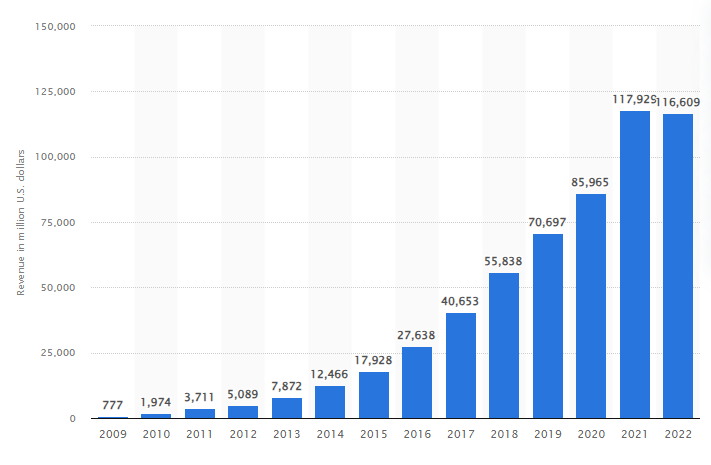
It isn’t a massive decline but it is worrisome. And the reason is simple: Marketers are turning away from Facebook.
Why?
Here are the top reasons:
The competition on Facebook is fierce. It is hard to stand out from the crowd and reach your target audience effectively through organic reach for two major reasons:
The Facebook algorithm uses different signals and predictions to show its users the most relevant posts they are likely to engage with in their feeds as explained here. The algorithm focuses on showing similar types of content a person has engaged with in the past in the feed and this is where it gets problematic.
This restricts your reach to new audiences organically. And this is where Facebook encourages businesses to boost a post or run ads to reach the target audience.
If you want to grow your ecommerce brand organically on Facebook, you have to publish new content regularly and you must create content similar to what your audience has engaged with in the past. This isn’t too healthy for your brand image and uniqueness because you will end up publishing content similar to your competitors – eventually hurting your brand identity.
Organic growth is very time-consuming. It seems nearly impossible to grow your ecommerce store organically as compared to what you can achieve with a Facebook ad in a single day.
Facebook is designed in a way that it promotes its advertising network to businesses and marketers.
Facebook ads are expensive. On the surface, the cost per click seems quite low which is $1.68 across all industries. CPC isn’t a true representation of advertising cost and it might be misleading.
The average cost per action on Facebook Ads across all industries is $19.68 and this is a true representation of cost:
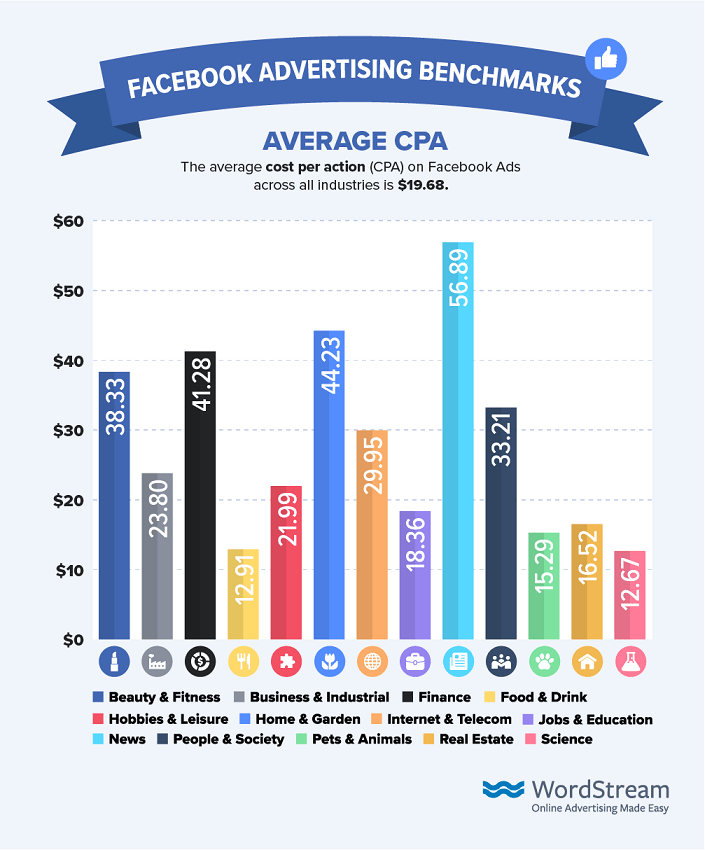
Paying $20 per lead will significantly increase customer acquisition cost and lower customer lifetime value. You will get new customers but the cost you pay for acquiring new customers is quite high.
For a balanced and profitable business model, CLV must be higher than CAC:

Low CAC is hard to achieve with Facebook ads due to the following reasons:
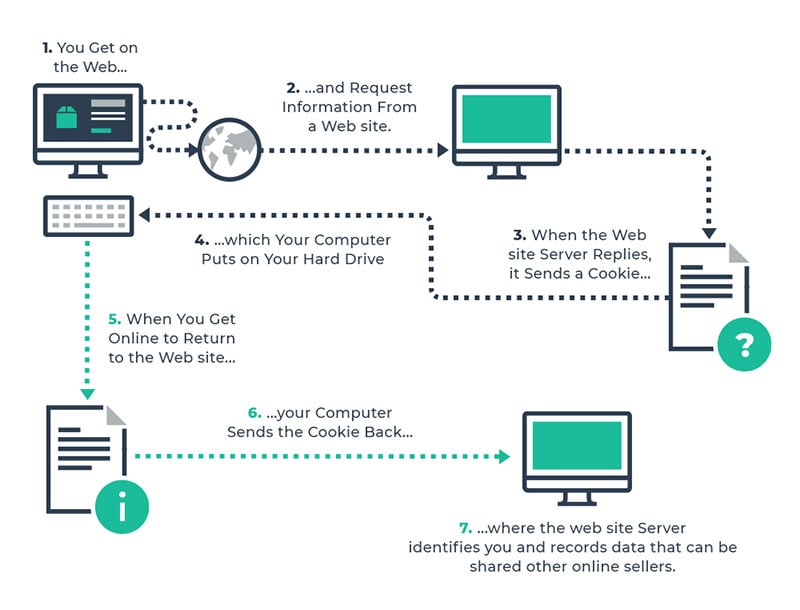
Third-party cookies are used by advertising networks like Facebook for tracking. These cookies play a key role in conversion tracking, remarketing, lead tracking, and other ad campaigns. Facebook Ads uses first-party and third-party cookies for tracking purposes.
And your Facebook advertising cookies might be blocked by some browsers.
The end of third-party cookies also means you can’t use advanced tracking tools for Facebook advertising. This is a limitation that makes Facebook Ads a turn-off for ecommerce businesses. Leading browsers disable third-party cookies which makes it a challenge to run ad campaigns with full tracking access.
Users, on the other hand, use ad blockers to block ads as they don’t find them intrusive. A whopping 42.7% of internet users use ad blockers and the number one reason people use ad blockers because they see too many ads:
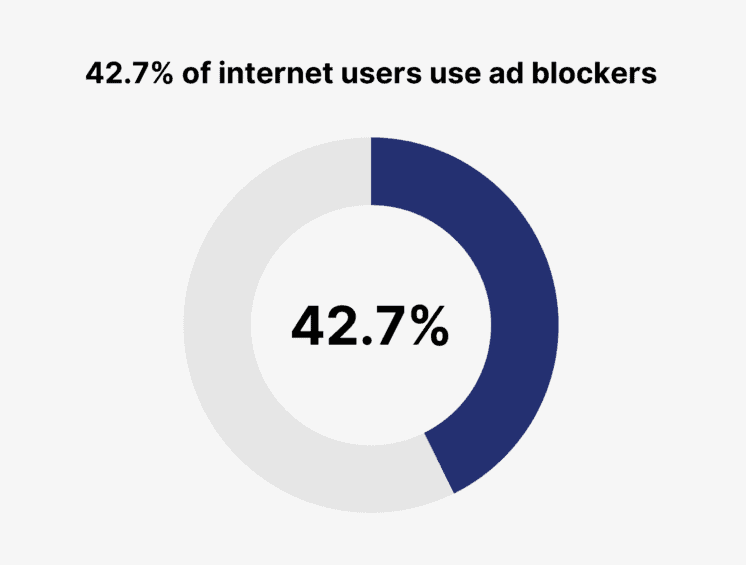
So, you have to deal with third-party cookies and users as well.
Ad fraud is on the rise which is another major issue faced by marketers. It is estimated that ad fraud takes one dollar for every $3 spent on online ads and 4% of revenue is lost by businesses to ad fraud each year.
Ad fraud isn’t limited to Google Ads only. Facebook has more than 270 million fake accounts which also include duplicate accounts. Imagine Facebook shows your ad to the same person multiple times (costing you money).
Detecting click fraud is a big issue for businesses. You can use a sophisticated fraud detection tool that costs money. And these apps don’t catch all types of click fraud and can miss some types of ad fraud.
People don’t like seeing ads on social media including Facebook. People use social platforms for interacting and socializing. They aren’t in the buying mode.
As much as 57% of people say that they don’t like ads that play before a video and a whopping 45% of people don’t watch ads at all:
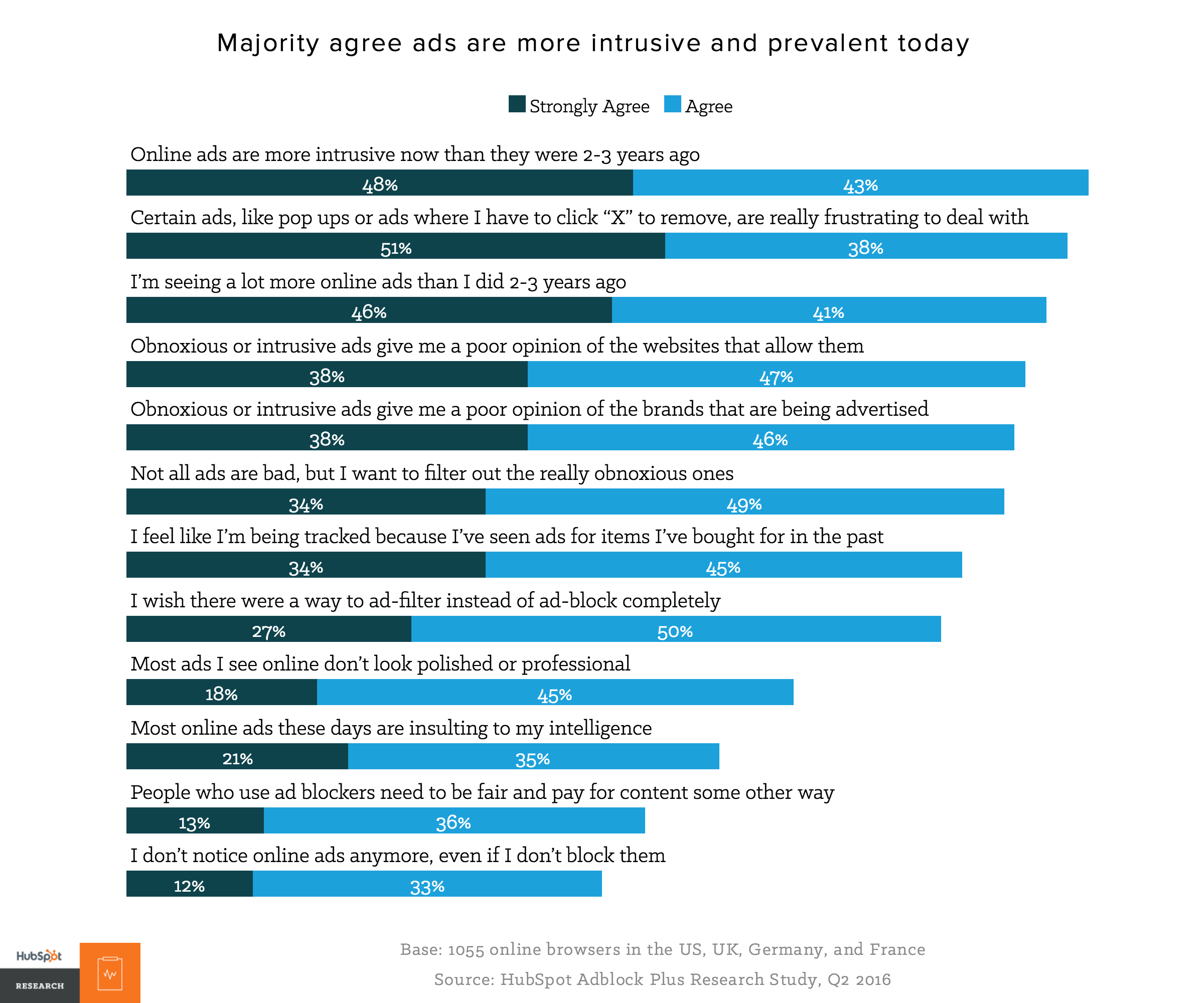
Consumers, in general, are now desensitized to online ads. Even if they aren’t using ad blockers, most people don’t look at ads and even if they see one, they are least likely to take an action (aka convert).
This is a reason why ecommerce businesses are switching to other marketing methods.
There are multiple Facebook alternatives that you can use to promote your online store and grow your business:
Partnership marketing and cross-brand collaborations are the best way to grow your ecommerce business. It is one of the best alternatives to Facebook as it makes it extremely easy to generate sales with a minimal marketing budget.
Research shows that 16% of all ecommerce sales globally are attributed to partnership and affiliate marketing.
You can collaborate with other businesses to jointly cross-promote each other’s products. It is a marketing strategy where two or more businesses partner to achieve common marketing goals.
Here are the reasons that make collaboration marketing better than Facebook for growing your business:
The drawbacks of Facebook marketing are offset by partnership marketing making it an ideal alternative.
How do you get started with collaborations?
The great way to find the right partners for your business is to use a dedicated networking platform like Subkit. Manual outreach to potential partners with proposals is a complicated and tedious task. Subkit, on the other hand, instantly connects you to other businesses and your products are bundled together for cross-marketing.
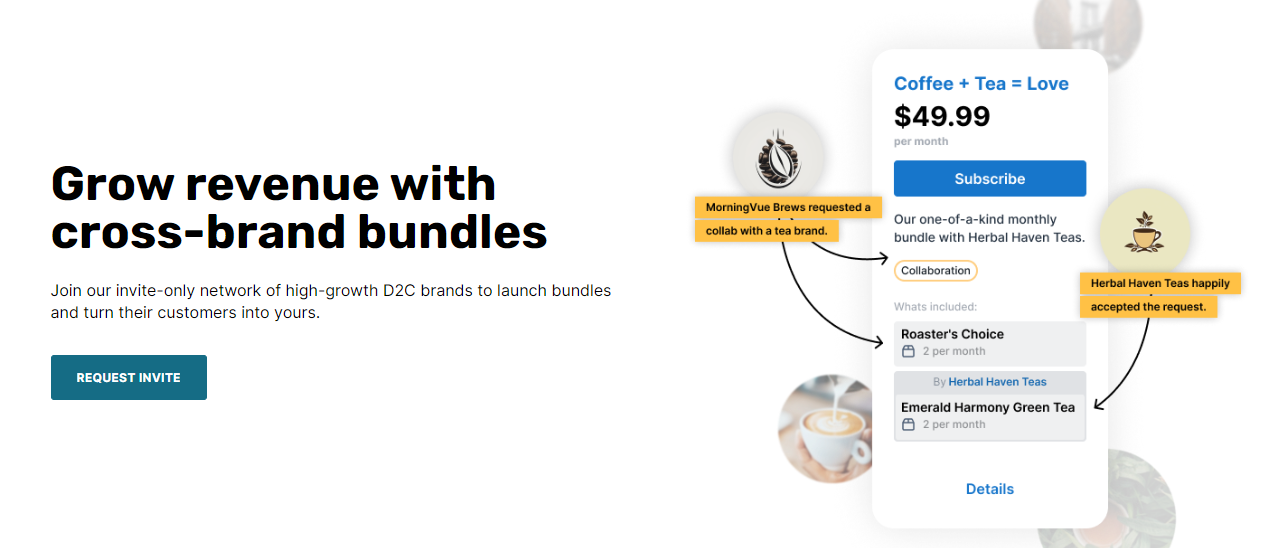
Here is how Subkit works for businesses:
Subkit makes it easy to collab with like-minded businesses and influencers at no cost. It is a free platform that is focused on growing revenue with cross-brand bundles.
Organic reach is your best bet if you are interested in a sustainable marketing strategy as an alternative to Facebook marketing.
Search engines are the biggest source of traffic and that’s where you need to be. The problem with organic traffic is that it isn’t instant. It needs time. And this is a reason why most businesses don’t prefer spending their resources on content marketing and SEO.
According to Ahrefs, it takes an average of 3 years for a page to reach Google’s top 10 search results:
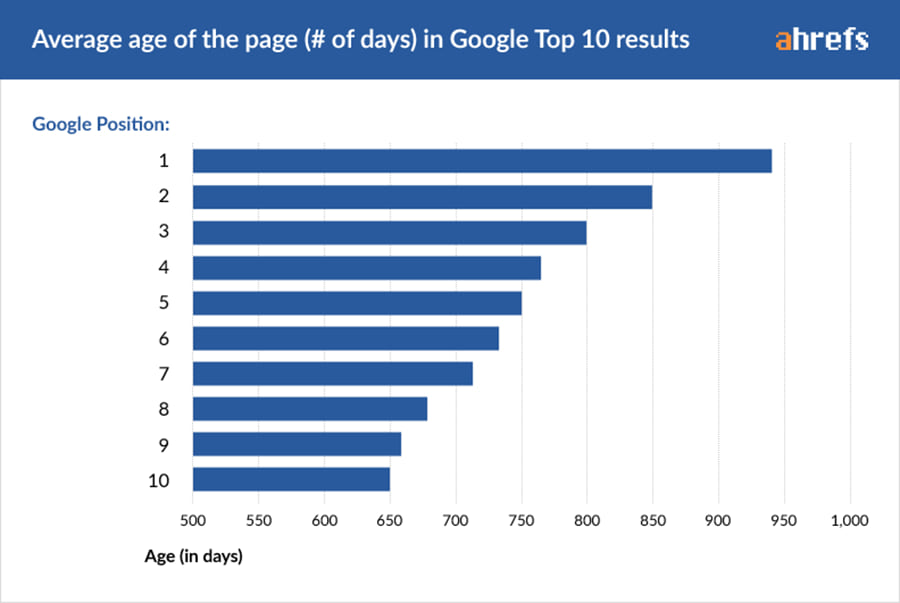
The good thing about organic traffic is that it is sustainable. A piece of content that you have published today will generate traffic for years to come without any additional investment. This isn’t the case with online ads where you have to spend money to generate traffic and leads. And the traffic isn’t sustainable with Facebook ads. The moment you pause your campaigns, the traffic stops.
You need to have a robust content marketing strategy to grow your business’s organic traffic. Content marketing covers content creation, publication, distribution, and promotion. Follow these best practices to increase your organic traffic, convert more customers, and boost your revenue:
Nothing works better than building, nurturing, and growing your own community. It is a marketing strategy where you engage with your audience in a conversation around a topic of interest where they all exchange value.
The benefit of a community is that it helps you engage with your customers, grow your business, improve customer experience, acquire new customers via word-of-mouth, and increase customer loyalty and retention.
Research shows that online communities increase engagement by 21%, 66% of community members say that communities make an impact on their brand loyalty, and 55% of branded communities said that community helped them generate sales.
Lego Ideas, for example, is an online community created by Lego in 2014. It lets Lego users share their creations and ideas with other members. Users can upvote and downvote ideas and creations. It also runs challenges where members can submit their creations for participation:
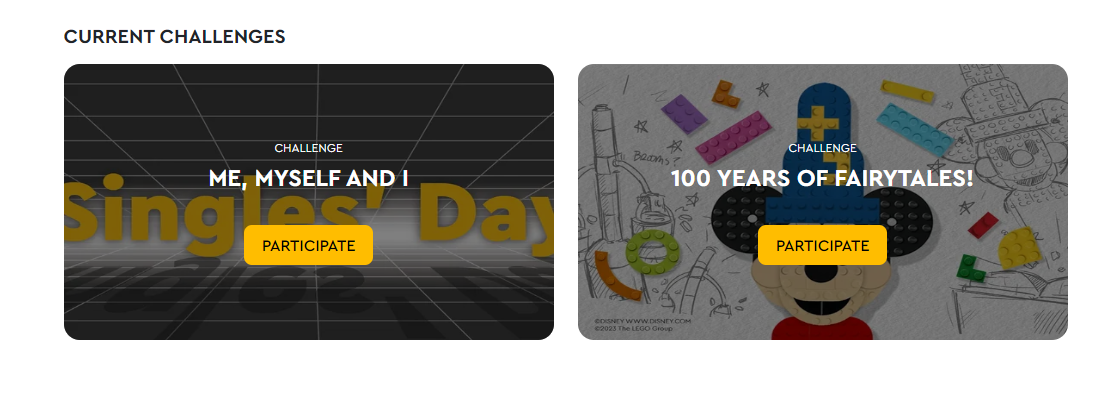
This type of community grows automatically and is extremely loyal. At the same time, it needs a lot of time and effort to build. Importantly your community should have a solid foundation. You can’t build a community around anything. Your audience must be willing to join and share their time and stay committed.
Here are some ideas for community marketing for exponential business growth:
Community marketing works great for business growth and it is free to build. However, it needs a lot of hard work and dedication.
Affiliate marketing is a type of partnership marketing that is geared towards generating sales via your partners (known as affiliates). You pay affiliates for successful sales that they generate. This makes affiliate marketing a great way to grow your small business.
You can partner with other businesses, influencers, bloggers, and thought leaders for generating sales. Since you offer them a fixed commission per sale, you will easily find a lot of partners if you have a valuable product.
A Forrester study reported that 84% of publishers and 81% of advertisers use affiliate marketing and over half of them said that affiliate marketing accounts for up to 20% of their annual revenue:
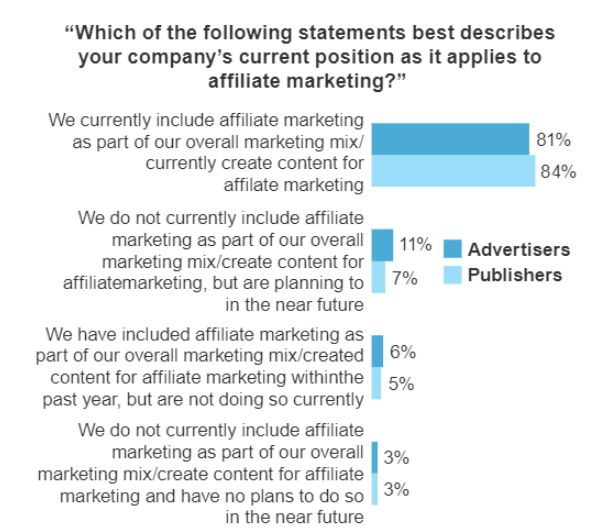
There are several benefits of affiliate marketing that make it an ideal marketing channel for small businesses and ecommerce companies:
There are two ways to run an affiliate marketing campaign for your business:
The benefit of using an affiliate network ShareASale is that it connects you with hundreds of affiliates. You can handpick affiliates. The affiliate network handles your affiliate program and payments which makes it trustworthy. Affiliates feel safe and secure when they work via an affiliate network.
If you decide to run your affiliate program in-house, you have to find affiliates yourself which is a hectic process. Affiliates usually don’t feel too secure when working directly with businesses as the business controls everything which makes the process less transparent.
You can go with any option and kickstart your affiliate program to grow your business without having to rely on Facebook.
Switching to traditional marketing such as TV and radio ads and billboards is another great option to avoid Facebook.
Traditional marketing spending is reducing while businesses are spending more on digital marketing. A survey reported that traditional marketing spend decreased significantly in late 2022 and early 2023:
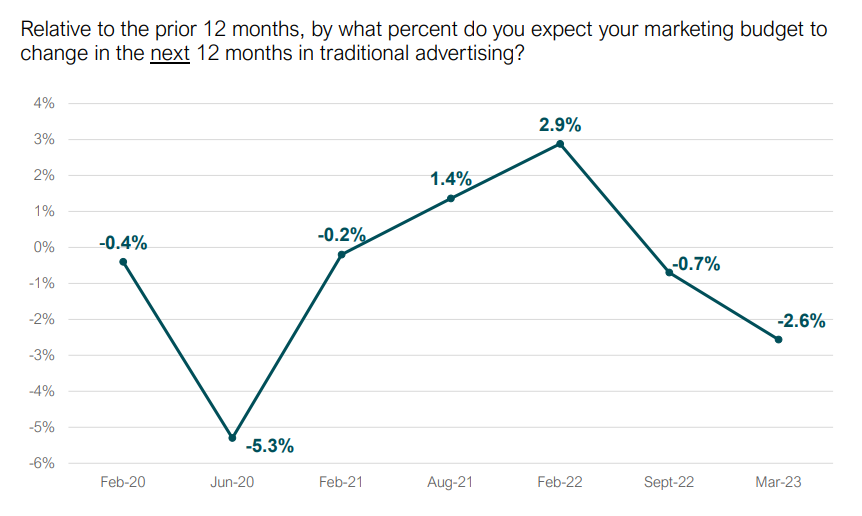
This means the competition in conventional marketing is reducing and as a business, you should capitalize on it. As businesses are moving towards digital marketing, you should go an unconventional path.
There are certain marketing objectives that can be best achieved with traditional marketing such as:
Importantly, people usually use ad blockers for online ads and the best way to reach those people is through conventional marketing. What makes traditional marketing best is that it isn’t intrusive like digital ads.
Print ads, for example, are non-intrusive. They are part of the newspaper and only those people who are interested in an ad or a brand will interact with a print ad. This is a reason 82% of people trust print ads the most when they are making a purchase a decision:
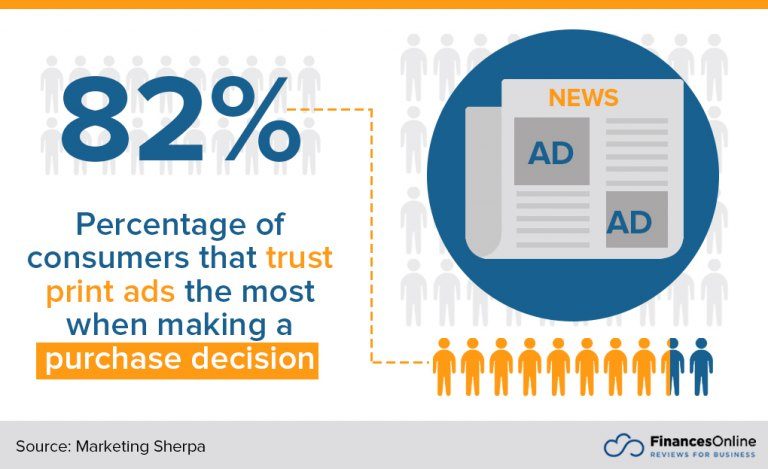
Conventional marketing is a nice way to grow your business without relying on Facebook.
Facebook is a popular social media platform and it is a goldmine for marketers and businesses. It offers some of the most cutting-edge advertising features including lookalike audiences, custom audiences, dynamic product ads, carousel ads, video content, and much more.
But all these exclusive features aren’t enough to make business owners stick with Facebook and its ad network. It is not as effective as it used to be due to high cost, low organic reach, high competition, ad fraud, and consumer desensitization.
You can use Facebook alternatives and the best being them is partnership marketing. Collaboration with other businesses is a cost-effective and sustainable marketing approach to business growth. You can create product bundles and cross-promote to your audience and your partner does the same. This helps you reach a new audience instantly without losing your brand image and credibility.
It is a non-intrusive marketing technique that delivers better results.
Subkit makes cross-brand collaboration easier for ecommerce businesses by giving you instant access to relevant business partners. You can run a new cross-brand collaboration every month. The partnerships are focused on generating sales where both partners promote product bundles to their audience.
You can join Subkit free here and start your first Collab today!
Leverage Facebook's advertising platform to elevate your business. With an average 8% conversion rate, it's a top-choice for marketers.
Uncover the top factors that most impact your Facebook conversion rate – and learn how to improve!
Boost your Facebook Ads conversion rates with expert tips on striking the right balance between ad budget, creativity, and technical aspects.
Receive an email when new blog posts are published.